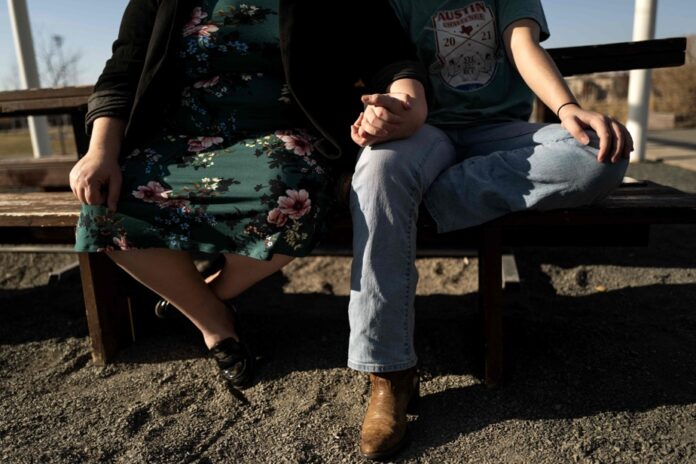(Minneapolis) We had to leave Texas, and quickly. Measures targeting transgender minors were on the rise, so Mary reviewed states in the United States where her child could fully live out their identity. This is how the family packed their bags, heading to Minnesota.
“The idea of the state (of Texas) betraying us in this way, I still can’t quite get over it,” Mary told AFP, sitting in a Minneapolis public garden alongside Jasper. , 16, on an unusually hot April day.
The hurt is all the more acute because Mary and Jasper — aliases they chose to protect themselves — have, like many Texans, a strong sense of belonging to their state. They miss their extended family and friends. This afternoon, Jasper, who now identifies as a boy, came over with a crossed out T-shirt with the name of his hometown, Austin.
But in Minnesota, where they settled last summer, “it feels much, much safer,” says Mary. The welcome was so warm despite the harsh winter months, the procedures for having Jasper’s first name recognized at school so simple that his mother cried with emotion more than once as she was about to leave. claws, she says.
This northern state has indeed pledged to do so: it will be a “safe haven” for families fleeing the avalanche of legislation aimed at restricting the rights of transgender children elsewhere.
Like abortion or racism, the issue of transgender minors is at the heart of the “culture wars” that are widening the gap between American states.
In areas they control, conservatives have gone on the offensive to outlaw transitional treatments for teenagers or ban transgender students from using the toilets of the sex they identify with.
No student born with a male gender in the girls’ toilets, they insist, despite statistics showing no increase in aggression.
In Texas, parents have even been investigated by child protective services.
On the contrary, states run by the other side like Illinois or California want to be “sanctuaries” for trans youth.
The Minnesota capitol has just passed a law guaranteeing care for trans people from elsewhere.
“We’re trying to not just say that being trans is okay, but that you can come here and be safe,” Minnesota’s first openly transgender elected official Leigh Finke, who led the legislation, told AFP.
Because, she recalls, “the average lifespan of trans people is very low”. “We know what it means to force people not to be themselves: it’s either the coffin or the closet.”
That’s why caring for transgender minors “saves lives,” pediatrician Angela Goepferd, program director at Children’s Minnesota, a major medical center, told AFP.
Children who have access to it “are less depressed, think about suicide less often and act out the act less often,” she insists.
Beyond the partisan divisions, which see one side accusing the other of “mutilating” children, some parents, even of progressive sensitivities, say they fear that irreversible treatments will be offered too soon to minors in full questioning about their identity. and who might later regret their choice.
According to Angela Goepferd, the surgery is “almost exclusively for people over the age of 18,” although some minors—”less than 1% of older teens, 16 or 17″—may have access to mastectomies (removal of breasts).
Care is mostly, she says, “meeting families, answering questions, helping to see how to support a young person at school.”
“Then, for some children who are at puberty or older, it may involve medication”: hormone blockers, the pill (to stop having periods), testosterone or estrogen.
With the battle between conservatives and progressives showing no signs of abating, Leigh Finke expects “thousands of families” to move to Minnesota.
Mary is aware that with her husband and Jasper, they were lucky to have the means to leave Texas. She says she knows families “who can’t and are just holding their breath.”
Jasper is still very nostalgic for his home state and can’t wait to get back there on vacation this summer, but his mother is confident he will adjust to Minnesota.
As for her, she continues to gasp with relief every time Minnesota passes a transgender-friendly measure, she said.


















